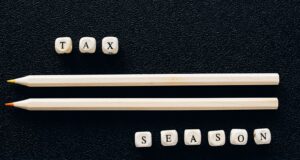Preparing for Tax Season
Written By: Brian Ellenbecker, CFP®, EA, CPWA®, CIMA®, CLTC®

Another tax season is upon us. While it can be a stressful time of the year, there are things you can do to reduce that stress. Follow these tips to make tax season easier on yourself and your tax preparer.
Give Yourself Plenty of Time
One of the things that can create the most stress is the pressure of trying to get everything done at the last minute. Give yourself plenty of time. Designate a place where you will compile your tax forms as they come in. You will typically receive them all by early March. The exception might be any investments, trusts, or other entities that issue K1s. Those sometimes come late in the tax season. If you anticipate receiving K1s, be sure to let your tax preparer know so they can plan accordingly. K1s are one of the most common reasons you may need to file for an extension.
Tax Planning Note: If you file for an extension, only the filing deadline is delayed. The tax payment deadline is still April 15. If you expect to owe, an estimated payment should be made by April 15 to reduce/eliminate any late penalties and interest.
Starting early helps you and your tax preparer alleviate any deadline pressure leading up to Tax Day, which leads to fewer errors and might even allow for more time to find ways to reduce your tax bill. Take the time to double check your work or review the return that was prepared for you to help ensure accuracy.
Leverage Your Tax Preparer’s Questionnaire
Most tax preparers ask their clients to complete a tax questionnaire or tax organizer. While the process may seem tedious, your tax expert has spent a lot of time putting it together to ensure the proper questions are being asked. Completing it helps provide all the required information without overlooking or forgetting anything. Starting early in the tax season and being thorough can help take the stress out of completing this document. Once finished with the questionnaire, try to provide all documentation at once.
Keep Last Year’s Documents Handy
Having last year’s tax return and supporting documents handy can help ensure accuracy. It gives you something to compare to. Most items from last year’s return will probably be on this year’s return.
Typically, you want to keep your tax documents for three years, which is the limit for filing an amended return, unless you have certain uncommon transactions. It’s also helpful to keep annual summary statements for your investment accounts. Many of these documents are now available online or can be stored electronically, so the need to keep paper documents is limited.
Remember your Bank Interest
For several years, bank accounts paid little to nothing in interest, and most accounts did not generate enough interest to result in a 1099 being generated. Now that rates are higher, you are much more likely to have earned reportable interest on your bank accounts.
Remember to Check Online for Important Tax Information
If you’ve elected to receive documents electronically, this likely includes your tax forms. Don’t forget to check online for tax forms if you have not received them in the mail. Comparing this year’s forms to last year can be a great way to help avoid missing a key document.
Protect Yourself from Fraud and Identity Theft
Identity thieves are out in full force during tax season. They will try to send you texts, emails, social media messages or call you claiming to be from the IRS and trying trick you into providing them with personal information. If there are issues with your return, the IRS will send you a letter. They will NEVER contact you by email or text and wouldn’t call you about taxes owed without first sending a letter. E-filing helps deter identity thieves. If you’ve fallen victim to identity theft in the past, you can request an Identity Protection PIN from the IRS, which can deter fraudsters from filing fraudulent tax returns.
Provide a Copy of Your Tax Return to Your Shakespeare Advisor
Once you have filed your tax returns, provide a complete copy of both the federal and state return to your Shakespeare financial advisor. If possible, also include the supplemental worksheets and schedules that aren’t required to be filed. Your advisor will review your return for accuracy as well as use it for planning purposes and potential improvements for the upcoming year. Please reach out if you have any questions during these next few months of tax season.

